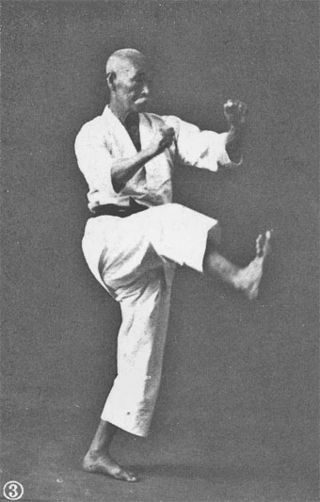
Karate (空手), also karate-do, is a martial art developed in the Ryukyu Kingdom. It developed from the indigenous Ryukyuan martial arts under the influence of Chinese martial arts. While modern karate is primarily a striking art that uses punches and kicks, traditional karate also employs throwing and joint locking techniques. A karate practitioner is called a karate-ka (空手家).

Shotokan is a style of karate, developed from various martial arts by Gichin Funakoshi (1868–1957) and his son Gigo (Yoshitaka) Funakoshi (1906–1945). Gichin Funakoshi was born in Okinawa and is widely credited with popularizing "karate do" through a series of public demonstrations, and by promoting the development of university karate clubs, including those at Keio, Waseda, Hitotsubashi (Shodai), Takushoku, Chuo, Gakushuin, and Hosei.
Keigo Abe was a prominent Japanese master of Shotokan karate who founded the Japan Shotokan Karate Association in 1999 and is its Chief Instructor. He held the rank of 9th dan in karate, was a direct student of Masatoshi Nakayama (1913–1987), and was a senior instructor in the Japan Karate Association.
Japan Karate Association is one of the oldest global Shotokan karate organizations in the world.

The Karate Union of Great Britain, or KUGB, is an association of Shotokan Karate clubs and Karateka operating across Great Britain, with some oversea affiliations. The 1960s saw a growth in the popularity of Karate, and the KUGB was founded in 1966 to be a democratic, not-for-profit organisation, and was the first single style organisation within the UK. Many other British Shotokan Karate organisations have since formed after splitting from the KUGB. The KUGB is currently affiliated to the European Shotokan Karate Association (ESKA) and the World Shotokan Karate Association (WSKA).
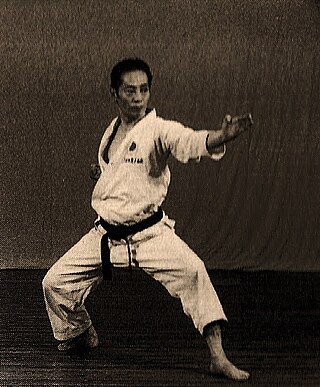
Tetsuhiko Asai was a prominent Japanese master of Shotokan karate of the Japan Karate Association (JKA), founder and Chief Instructor of the International Japan Martial Arts Karate Asai-ryu (IJKA), and founder of the Japan Karate Shoto Federation.
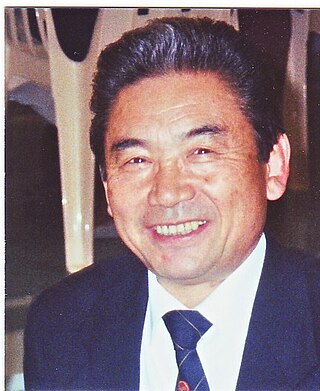
Takayuki Mikami is a Japanese master of Shotokan karate based in the United States of America. He holds the rank of 9th dan black belt in the art, awarded under the Japan Karate Association. In 1958, Mikami tied for first place in the All Japan Karate Championships. The following year, he became the All Japan champion in kumite (sparring) as well as kata (patterns). In 1961, Mikami won first place in kata again. He was also the first person to graduate from the Japan Karate Association's (JKA) instructor training program instituted by Gichin Funakoshi and Masatoshi Nakayama.

Yoseikan Karate (養正館空手) or Yoseikan Ryu Karate (養正館流空手) is the name given to the variant of Shotokan Karate taught at the Yoseikan Dojo in Shizuoka, Japan, under the direction of Minoru Mochizuki.

Yutaka Yaguchi was a Japanese karateka who was the Chief Instructor and Chairman of the International Shotokan Karate Federation (ISKF) Mountain States Region. He was born in Hiroshima, Japan, in 1932 and began karate training in 1952. He later tested under masters Gichin Funakoshi for his 1st dan black belt and Masatoshi Nakayama for his 2nd through 8th dan black belts. As one of the first graduates of the Japan Karate Association (JKA) Instructors' Training Program in 1959, he played an important role in the growth of JKA karate and the internationalization of Shotokan karate. Yaguchi first arrived in the United States on June 5, 1965. In 1974, Yaguchi founded the ISKF of Colorado, the regional headquarters for the Mountain States Region.
Andy Sherry was one of the most senior British practitioners of karate and the retired chief instructor of the KUGB. Andy Sherry, was convicted at Liverpool Crown Court of five criminal offences of a sexual nature relating to two complainants.
The Shotokan of England Karate Union (SEKU), founded in 1982 is a federation of Shotokan karate clubs in southern England, with about thirty clubs from Helston in Cornwall to Bromley in Greater London. The federation is led by Mick Dewey, 8th dan, who was a student of the late Keinosuke Enoeda.
JKA England (JKAE) is the official Japan Karate Association (JKA) organisation for Shotokan karate in England and Wales.

Keinosuke Enoeda was a Japanese master of Shotokan karate. He was a former Chief Instructor of the Karate Union of Great Britain. Enoeda was ranked 8th dan in Shotokan karate, and was widely renowned as a formidable karateka. Following his death, Enoeda was posthumously awarded the rank of 9th dan.
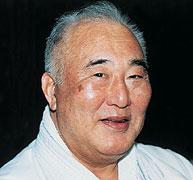
Taiji Kase was a Japanese master of Shotokan karate who was one of the earliest masters responsible for introducing this martial art into Europe. He taught his style of karate, Shotokan Ryu Kase Ha, in France from the late 1960s to the mid-1980s. In his later years, he travelled across the world teaching karate, but Paris remained his home. Kase held the rank of 9th dan in karate.
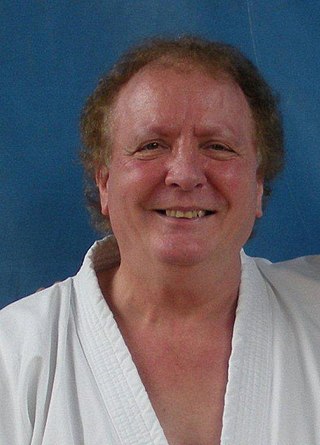
Malcolm Phipps is an English martial artist. He is a 9th Dan Hanshi in Shotokan Karate and is the chief instructor internationally to Seishinkai Shotokan Karate International (SSKI). He started training in karate in the early seventies with a local JKA club, then with Shotokan Karate International (SKI) with Hirokazu Kanazawa. He then moved on to the Amateur Shotokan Karate Association (ASKA), eventually leaving to form his own association, Seishinkai Shotokan Karate, in 1984 and finally turning international in 1995 to the group as it is today, SSKI, with clubs in England, the US, Kazakhstan and India. He was an advisory board member of the World Traditional Karate Organisation from 2003–2013.

Hideo Ochi is a Japanese master of karate. He is ranked 9th Dan, and is a former Japan Karate Association (JKA) World Champion in kumite (sparring) and kata (patterns). He was also coach of the German national team and Chief Instructor for JKA Europe. In 1997, he received the Order of Merit of the Federal Republic of Germany.
Japan Shotokan Karate Association (JSKA) was founded by Keigo Abe in 1999. Abe was a former instructor graduate of the Japan Karate Association and trained and taught at the JKA Headquarters for nearly 35 years. He held a number of senior positions within the JKA and latterly the Matsuno section of the JKA. He had been a senior student of Nakayama and as such the teachings of Nakayama remain an integral part of the evolution of the Shotokan style within the JSKA. Abe Sensei died on December 20, 2019. And he was awarded a posthumous 10th Dan by the JSKA Shihankai on his passing. The current Chief Instructor is Mitsuru Nagaki, 9th Dan, a student of Abe and former instructor with the Japan Karate Shotorenmei.
Norman Robinson is a South African master of Shotokan karate. He and Stan Schmidt were the first practitioners of Shotokan karate in South Africa and they instigated the establishment of the South African branch of the Japan Karate Association (JKA) in 1965 and popularized the art across the country. In 1970 he was one of the first westerners to be invited into the JKA's famous Instructor Class in the Tokyo Honbu dojo, the invitation having been offered by Masatoshi Nakayama himself. Latterly, he established Japan Karate Shotokai South Africa, having remained loyal to Tetsuhiko Asai after Asai established Japan Karate Shotokai. Norman Robinson is also a distinguished student of Judo, holding a 7th dan in that art, and is also known for his acting roles in several martial arts films. His son, Mark Robinson is multi-disciplinary martial artist and powerlifter.
Stan Schmidt was a South African master of Shotokan karate. Along with others, such as Norman Robinson, he was an early practitioner of Shotokan karate in South Africa and his establishment of the South African branch of the Japan Karate Association (JKA) in 1965 after training in Japan, along with his subsequent promotion of the art in South Africa, earned him the appellation of 'The Father of South African Karate'. In 1963, he was one of the first westerners to be invited into the JKA's famous Instructor Class in the Tokyo Honbu dojo and he was later one of four non-Japanese karateka to sit on the JKA's international Shihankai. He was also the first non-Japanese karateka to attain 7th dan from the JKA and also the first to attain 8th dan. Today, he is the highest ranking non-Japanese karate master of that organization. He is also known for his acting roles in several martial arts films of the 1970s and 1980s.











